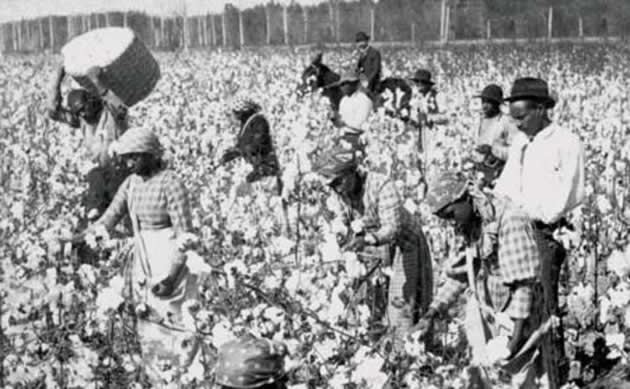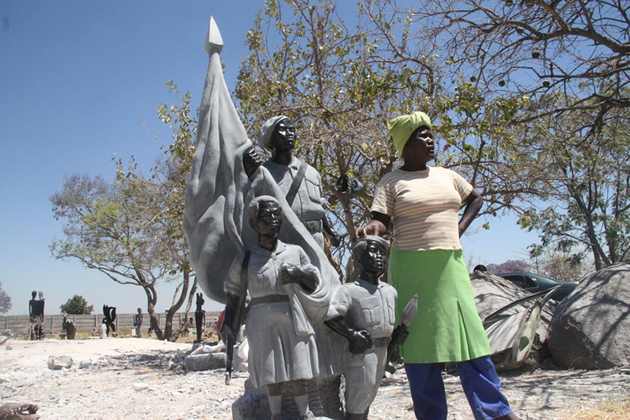We must be born again


FOREVER CHAINED . . . For us Africans to become successful as farmers and entrepreneurs we should refrain from the mindset that subscribes to the superiority of whites and inferiority of blacks
Joram Nyathi Spectrum
Formal employment in the Sadc region has on average, capacity to absorb a mere 20 percent of the labour force. That should be a sobering thought for the political leadership and business executives. It must be a sobering thought too for those involved in career guidance and for parents, most of whom
often wish to realise their unfulfilled dreams by foisting these on their offspring.
Where do the 80 percent go?
How do they survive?
Can parents do something to prepare them to be independent?
That is why there is need for a major paradigm shift, a dramatic change in the way we perceive education and the messages we transmit to our children. These innocent creatures are not there to bring to fruition our empty dreams; it is also damaging to make them fantasise about a glorious past we never lived and have them perpetually looking backwards for a better future.
The same way responsible parents will not wilfully transmit a disease to their child, it is scandalous that, for political expediency, deliberately but also out of ignorance, media and politicians often collude to recite misleading rhapsodies about our colonial past. There was nothing romantic, let alone idyllic for the black man, about life in Rhodesia.
I am one of those Neanderthals born in the 1960s. There was nothing romantic about growing up in rural Mberengwa where the only professions we were exposed to were teaching and nursing, where a tractor driver was the village Casanova.
While herding cattle, soaking in the rains in summer and enjoying wild fruits, and running long distances to school rewarded us with a strong physical constitution resistant to most common ailments which afflict today’s youth, this was despite ourselves.
It is a phase happily gone by.
For adults, if you were accused of some grave offence requiring police intervention, such as cattle theft, the arrival of a police van or two policemen on bicycles could mean the end of you. Many were made to run in front of the policemen riding their bicycles until they collapsed dead. Others died directly from beatings. We were too backward to know if there were any consequences for these callous crimes of the white man’s rule.
The white man was feared. We didn’t understand his language. It was enough that he could beat up everyone at will. I don’t know if we were ranked higher than slaves in America. What I recall is that a white woman could beat up the strongest black man. And they had dogs and guns. So we lived our separate lives, except when the baas wanted something done and silaphalapha was the media of communication. Black folk were at his command, whether as his labourers on the farm or villagers in the reserves.
We produced our own food then. For that we were never dependent on the white farmer, most of whom were into cattle farming, a more prized creature than the labourer. Those required to pay various taxes by the Native Commissioner were obliged to work on the farms. The rest went to towns to do menial jobs or sold their livestock or produce to pay hut tax or cattle dipping levies.
In our benighted little lives, those who worked in the cities seemed to have it all. Telling us about working ema Yadini (the white man’s suburbs). Fathers came home from the mines on Friday nights by bus, sometimes singing about the death of the Federation.
Once in a while during day time, if you were not beyond the hills herding cattle, you chanced upon the spectacle of the maroon ROC bus dropping students who had closed for Rhodes and Founders holidays. We admired in awe from a safe distance — a sparkling bus without the traditional door!
Otherwise the only person besides the white farmer known to own a car was the primary school headmaster or a prosperous shop-owner who drove the ubiquitous Peugeot 404 station-wagon. We were too scared to touch it.
In the 1970s the white man came up with contour ridges to reduce soil erosion. These became a must. Few appreciated their purpose. The situation was not helped by a mudomeni who projected himself as the white man’s representative on Earth.
My uncle Gideon loved digging the contours to perfection, sometimes widening them way beyond reason as if he wanted to drive a car through them. (The nearest he got to owning a car was a donkey drawn scotch-cart.) The digging broke our young backs. But we didn’t have a choice; there was no democracy, there were no human rights — only parents and the white man.
The 1970s also plunged us into a terrifying war to resolve these grievances of white rule and freedom. It brought with it a lot of trauma for villagers. To be labelled a sell-out was a death sentence. The civilian was caught between the proverbial rock and a hard place — the white establishment and its soldiers (black and white) on the one hand, and freedom fighters on the other.
Landmines destroyed buses, and schools were often set alight and headmasters or teachers were killed for being sell-outs, much of it a product of canards inspired by petty family jealousies.
Fast forward to political independence in 1980. It brought with it many opportunities. The barriers to university education came crashing down like the Berlin Wall a decade later. Now blacks could aspire to any profession, live in a suburb of their choice. Money was the only new barrier, and many blacks didn’t have it then, like black South Africans today.
Still, the euphoria of independence held. Education was the Holy Grail to riches, so we believed. With education you got a nice job typified by a necktie, a suit and an office. We despised the “lowly” crafts of industry, farming and other vocational skills. Not even the white farmer in khaki shorts and farmers shoes who owned 5 000 cattle could inspire us from the lure of the professions.
Perhaps that is where we let the independence train pass us by. We carried the malady of elitist colonial education as the guiding light; saw no virtue in learning to be skilled producers or entrepreneurs to create employment. We pined to be employed, best if the employer was white. You had arrived.
The land reform in 2000 set us on a painful journey out of Egypt. Needless to say a majority of us were not prepared for the shock, we didn’t have the skills to survive the rigours of life through the desert. We are desperate to return to the familiar toil under Pharaoh’s yoke.
Which brings me to the nub of the Spectrum this week.
The first point, let us not fool our children that we lived in the Garden of Eden in colonial Rhodesia. It’s the most contemptible lie for a parent to tell their child. The future of our children cannot be located in the past.
Second point, the Rhodesian economy is dead like a dodo. There will never again be a parting of the Red Sea to return to Egypt. That means we must learn new entrepreneurial skills to survive in the desert.
That is the new culture we must inculcate in the new generation. They should learn from the enterprising spirit of Rhodes’ Pioneers to found a new economy and create their own wealth away from Britain. From the rubble of the collapsed Rhodesian economy should emerge shoots of an indigenous breed of entrepreneurs keen to find their mother’s lost gold ring — golden opportunities. Let’s not infect our youth with the poison that this is the “new normal” from which we can only be saved by foreigners. The Rhodesia-type economy cannot create jobs for 80 percent of our population.
Finally, the book of John in chapter 3:1-7 sums up the gist of Spectrum this week. It tells the story of Jesus’ encounter with one Nicodemus:
“Now there was a Pharisee, a man named Nicodemus who was a member of the Jewish ruling council. He came to Jesus at night and said, ‘Rabbi, we know that you are a teacher who has come from God. For no one could perform the signs you are doing if God were not with him’.”
“Jesus replied, ‘Very truly I tell you, no one can see the kingdom of God unless they are born again’.”
“How can someone be born when they are old?” Nicodemus asked. “Surely they cannot enter a second time into their mother’s womb to be born!”
“Jesus answered, ‘Very truly I tell you, no one can enter the kingdom of God unless they are born of water and the Spirit. Flesh gives birth to flesh, but the Spirit gives birth to spirit. You should not be surprised at my saying, ‘You must be born again’.”
In secondary school our Bible teacher told us that a parable is “an earthly story with a heavenly meaning”. I think it should be “a heavenly story with an earthly meaning”. It’s time to exorcise the Rhodesian spirit of African servitude. We need a new spirit. Africa must be born again.








Comments